初一英语第六单元第一课时课件
人教版七年级英语上册第六单元第一课时(新版))PPT 课件
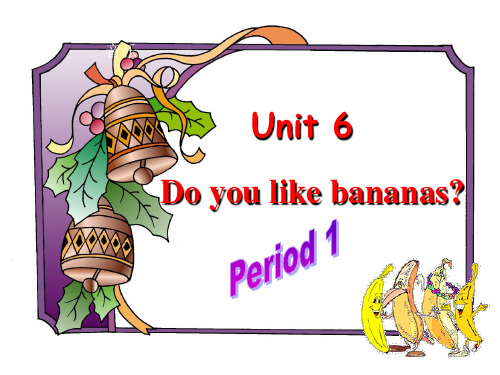
调查你的家人喜欢和不喜欢的食物。 Do you like…?
……
常听见这样的感叹:要是当初2018年 中国大 学毕业 生薪酬 排行榜 通过对 280多 万以及 多届毕 业生调 研后, 计算出 了各高 校毕业 生的薪 酬状况 。 虽然我们都知道名校毕业生的收入会普 遍比较 高,但 这份榜 单告诉 我们, 清华北 大毕业 生的月 薪,平 均近万 ,而普 通院校 的只有 两三千 。
[tə'mɑ:təu]
tomatoes
想一想:
我们刚刚学了哪些单词?
hamburgers ham['hbæumrbgəe:rɡə]
salad
['sæləd]
ice cream
[ais 'kri:m]
milk
[mɪlk]
bread
[bred]
bananas pears strawberries oranges
也就是说,从平均值看,名校毕业生的 收入就 已经遥 遥领先 好几倍 ,更不 用说那 些高薪 行业的 实际收 入差距 了。 好的大学,不一定保证每一个人都会有 高收入 ,但他 的确能 够为你 提供通 向高收 入的第 一块敲 门砖。 2 开学季前几天,老家的一个远房表兄传 来消息 ,刚满 17岁的 表侄小 立不愿 意再继 续读高 三,准 备辍学 去打工 。 表兄很是着急,把家族里学历比较高的 我也搬 了出来 ,希望 我能劝 劝小立 。 “我虽然这些年到处打工也挣了一些钱 ,但这 样挣钱 太辛苦 了,我 不希望 他重走 我的老 路,” 堂兄苦 口婆心 ,一再 强调, “你一 定要好 好劝劝 他:不 上学以 后没有 出路。 ” 刚开始我和这位00后表侄在微信上聊的 时候, 非常话 不投机 。 我问他:不想读
最新人教版七年级上Unit6全单元课件
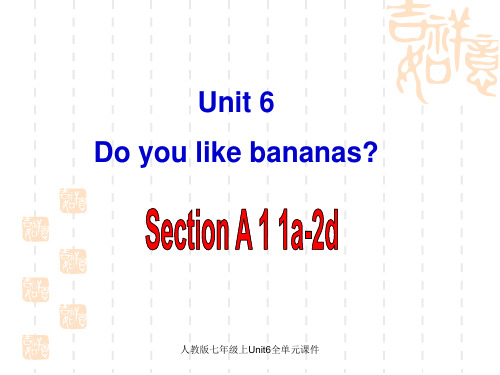
1 B: Yes, I do. A: Do you like oranges?
3 B: Yes, I do.
人教版七年级上Unit6全单元课件
1c Practice the conversations above with your partner. Then make your own conversations.
Bill: Sounds good. John likes hamburgers.
Jack: Oh, I don’t like salad. Bill: But John likes salad,
and it’s his birthday. Jack: Yes, you’re right.
What about the fruit? Tom: I think John likes strawberries and apples. Bill: OK. Let’s have strawberries and apples then.
人教版七年级上Unit6全单元课件
2d Role-play the conversation.
Jack: Hey, John’s birth day dinner is next week. Let’s think about the food.
Tom: Sure. How about burgers, vegetable salad, and some fruit?
strawberry --- strawberries
rice
tomato ---- tomatoes
初一英语《Unit6_I’m_watching_TV》整个单元PPT课件

running
drawing
Is he/ she painting? Yes,he/she is. Are they playing the trumpet? Yes, they are. No, they aren’t.
Are you doing homework? Yes, I am. / No, I’m not.
选择填空:
1. What are you doing? I_____ A. eat B. can eat C. eating D. am eating 2. We want _______this book. A. reading B. am reading C. read D. to read 3. Our teacher is __the blackboard . A. clean B. cleans C. cleaning D. to clean 4. That boy isn’t ____the teacher . A. listen B. listens C. listening D. listening to
He is cooking.
He is drawing.
What’s he doing?
He is thinking.
He is sleeping.
He is eating an apple.
He is fishing.
What’s she doing?
She is singing.
She is reading.
Unit 6
I’m watching TV.
What are we doing?
We are having an English class now.
人教版七年级英语上册第六单元第一课时课件.ppt

• e.g tamato-tamatoes orange-oranges
•
strawberry-strawberries
•
hamburger-hamburgers
• 不可数名词:uncountable nouns:
• e.g milk , bread , rice
• 既可数又不可数名词:countable and uncountable
5.orange _e__
6.ice cream __f _
7.salad __c_
8.bananas _b__
9.strawberries_i__
10.pears__j___
j
Task of listening
1b
2
A: Do you like salad? B: No, I don’t.
1
A: Do you like B: Yes, I do.
Yes, he does.
Does she like oranges? Yes, she does.
Does she like bananas? No, she doesn't.
Do they like apples? Yes, they do.
Grammer:
• like 是 实义动词,单三形式为 “likes”做句型变换时找助动 词“do"或“does”
bananas?
3
A: Do you like B: Yes, I do.
oranges?
1c
Do you like bananas?
Practice the conversation above. Then make your own conversations.
新目标英语七下第六单元第一课时

They are dancing.
The man is playing The old woman is walking. with the balls.
2b Put these questions and answers in order to make a conversation. Then listen again. Are you correct?
2、结构:
现在进行时是由助动词be(am/is/are)加现在分词构成的。 I am watching TV now.
He is doing his homework.
They are playing basketball.
现在进行时态
表示现在正在进行的动作. 结构: be (am, is , are )+ 动词现在分词 ( - ing ) 常见的表示时间的词语: I am doing homework now. Look! Tom is playing soccer. Listen! They are reading English. Where is your mother? She is cooking dinner.
现在分词的构成规则如下(同步学习P54): 1)一般动词后直接加-ing. 如: reading, watching, seeing 2)以不发音的e结尾的词去掉e再加-ing. 如: make—making write—writing 3)以重读、闭音、单辅音字母结尾的词, 双写这个辅音字母,再加-ing. 如: get-getting, swim-swimming put-putting, run-running
Unit 6 I’m watching TV
人教版七年级英语上册第六单元全单元ppt课件

二人称单 复数.第三
like
don't like Do..like...?
Yes,...do./ No,...don't.
人称复数
第三人称 单数
likes doesn't like Does...like...?
Yes,...does./ No,...doesn't.
3a Underline the correct words in the
例词
families dictionaries
boys keys
tomatoes potatoes
photos radios
Plural Forms
Countable nouns可数名词
hamburgers, bananas oranges, pears, tomatoes, strawberries
milk
uncountable nouns不可数名词
tea
water
meat
可数名词和不可数名词
不可数名词 (1)定义:是指不能计数的名词。 (2)不可数名词前不可以用 a , an 限定。 (3)不可数名词前不可以用 one, two , three… 限定。 (4)不可数名词没有复数形式。
Countable and uncountable nouns 既可数也不可数
可数名词复数形式的构成 1
名词特点 词尾加法
单词原形
一般情况下
加-s
desk apple
tree树 orange
以-s, -x, -sh, -ch 结尾的
加-es
以 f 或 fe 改f或fe为v
结尾的
再加-es
box
新目标英语七年级上册unit6Period1公开课课件

02
实施
03
04
安排5-10分钟时间,让学生 提问。
教师解答学生的疑问,并引导 其他学生参与讨论。
Teacher's Q&A session
目的: 教师解答学生疑惑,提供个性化指导。 教师收集学生的问题,挑选有代表性的进行解答。
实施
对于共性问题,教师可组织小组讨论或邀请学生分享经 验。
Classroom interactive games
Try to understand the cultural background and context of the text.
Practice listening, speaking, writing and translation to
improve English proficiency.
深入解析语法规则
通过讲解、演示和练习,使学生深入理解Unit6涉及的语法知识点,如现在进行时、一般将来时等,并能在实际语境中运用。
Text Analysis
培养阅读理解能力
通过对Unit6的课文进行深入分析,引导学生理解文章的主题、结构和语言特点,同时提高学生的阅 读速度和理解能力。
03 teaching method
培养批判性思维
学生在讨论中学会倾听、思考、表 达自己的观点,培养批判性思维能 力。
增强沟通技巧
小组讨论让学生学会与人沟通、协 商、达成共识,提高沟通技巧。
04 Teaching interaction
Student questioning session
01
目的: 鼓励学生主动提问,促 进知识内化。
Reading and Understanding: A Trip to New York City
七年级英语下册第六单元第一课时

2.学会并掌握句型①-What are you doing?
-I’m watching TV
-Is he writing a letter?
-Tomat a picture?
-,
四、反思
收获:总结一下在这节课中你所学短语_________________
学习本节课后,我能用英语进行谈论课堂用语___________________
5. -Where’s your father?
-He(make)a kite in the room.
Ⅱ句型转换
6.They do their homework every day.(用NOW改写句子)
Theyheir homework now.
7.Tom is looking at a picture.(改为一般疑问句并作出肯定回答)
A: What are Dave and Mary doing?B: They are eating dinner.
A: What is John doing?B: He is doing homework.
(通过听力训练,现在进行时的结构得以很好的落实)
Task1:对话练习
A: What’s he doing?
-Yes, he is ./No, he isn’t.
3.能力目标:会使用现在进行时进行描述现在正在发生的事情。
【重点难点】
重点单词:phone, mall, movies, sound, show, boring, library, soccer. watch TV, do homework, eating dinner, talking on the phone
人教(PEP)版英语七年级上册课件: unit 6 Section A

Bill: But John likes salad, and it’s his birthday.
Jack: Yes, you’re right. What about the fruit?
—Yes, I do.
— Do you like _to_m__a_t_o_e_s __?
— No, I don’t like _to_m__a_t_o_e_s ___.
— Let’s have _i_ce_-_c_r_e_a_m_.
— Oh, no. — No? — I don’t like
_i_c_e_-c_r_e_a_m__.
Bill: But John likes salad, and it’s his birthday.
Jack: Yes, you’re right. What about the fruit?
Tom: I think John likes strawberries and apples.
Bill: OK. Let’s have strawberries and apples then.
— Are you going with us? 你和我们一起去吗?
— Sure. 当然啦。
5. dinner n. (中午或晚上吃的)正餐 dinner 指一日中的主餐,可中午吃,也 可晚间吃。但多用于指宴请客人的正式 的一餐。
It’s time for dinner. 该吃晚饭了。
dinner party 宴会 dinner table 餐桌 dinner time 吃饭时间
人教版七年级上册英语第六单元第一课时教案设计
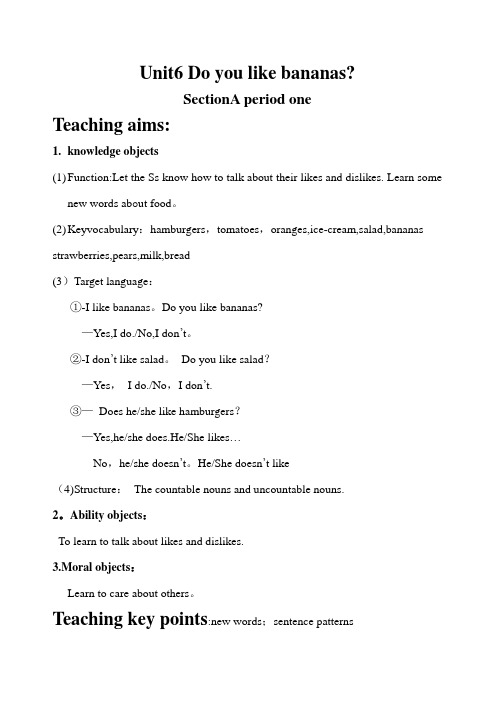
Unit6 Do you like bananas?SectionA period oneTeaching aims:1.knowledge objects(1)Function:Let the Ss know how to talk about their likes and dislikes. Learn somenew words ab o ut food。
(2)Keyvocabulary:hamburgers,tomatoes,oranges,ice-cream,salad,bananas strawberries,pears,milk,bread(3)Target language:①-I like bananas。
Do you like bananas?—Yes,I do./No,I don’t。
②-I don’t like salad。
Do you like salad?—Yes,I do./No,I don’t.③—Does he/she like hamburgers?—Yes,he/she does.He/She likes…No,he/she doesn’t。
He/She doesn’t like(4)Structure:The countable nouns and uncountable nouns.2。
Ability objects:To learn to talk about likes and dislikes.3.Moral objects:Learn to care about others。
Teaching key points:new words;sentence patternsTeaching difficult points:To talk about the countable nouns and uncountable nouns. Teachingmethods:Pairwork;Groupwork;Free talk;Listening Teaching aids:ppt; some real objectsTeaching procedures:Step1:Lead in(1)Show a ping—pong ball。
七上6单元英语作文课件
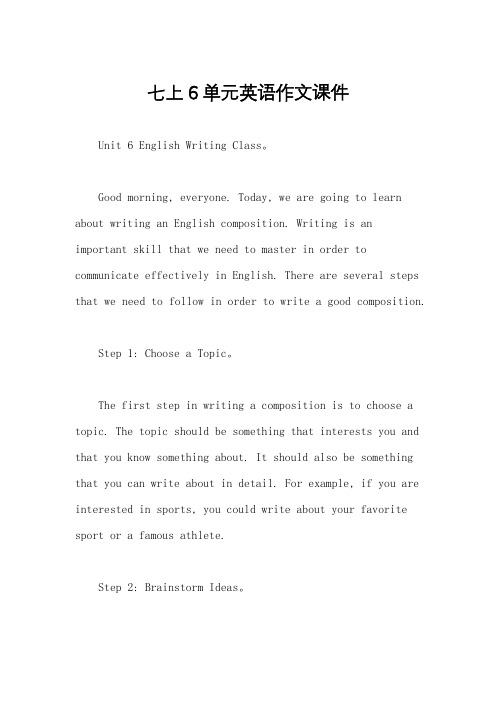
七上6单元英语作文课件Unit 6 English Writing Class。
Good morning, everyone. Today, we are going to learn about writing an English composition. Writing is an important skill that we need to master in order to communicate effectively in English. There are several steps that we need to follow in order to write a good composition.Step 1: Choose a Topic。
The first step in writing a composition is to choose a topic. The topic should be something that interests you and that you know something about. It should also be something that you can write about in detail. For example, if you are interested in sports, you could write about your favorite sport or a famous athlete.Step 2: Brainstorm Ideas。
Once you have chosen a topic, the next step is to brainstorm ideas. This means thinking of all the different things you could write about related to your topic. For example, if you are writing about your favorite sport, you could brainstorm ideas like the rules of the game, your favorite team, or your favorite player.Step 3: Organize your Ideas。
Unit6SectionB(1a_1e)课件人教版英语七年级上册
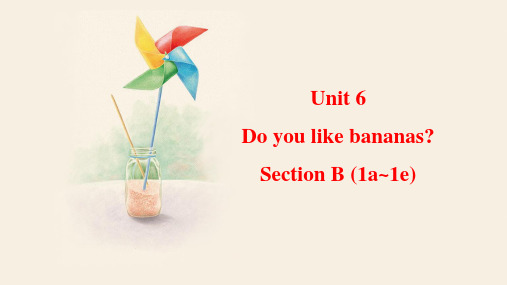
学习目标 新知学习 重点研讨 课堂小结 当堂检测
Pair work
What do you like for
breakfast? lunch?
dinner?
I like...for breakfast / lunch/ dinner.
学习目标 新知学习 重点研讨 课堂小结 当堂检测
1a Write the number of each word next to the correct food.
学习目标 新知学习 重点研讨 课堂小结 当堂检测
(3)have sth. for breakfast/lunch/dinner早(午、晚)餐吃…… eg:I have chicken for lunch.es and rice for dinner. 她晚餐吃蔬菜和米饭。
three chickens三只小鸡
学习目标 新知学习 重点研讨 课堂小结 当堂检测
3. breakfast
名词,意为“早餐”。
4. lunch
名词,意为“午餐”。
5. dinner
名词,意为“晚餐,正餐”。 常用短语: (1)at breakfast/lunch/dinner在吃早(午、晚)餐 (2)have breakfast/lunch/dinner吃早(午、晚)餐 在此短语中breakfast/lunch/dinner前面不能加冠词the或a, 但可以说have a big breakfast, have a quick breakfast。
Unit 6 Do you like bananas?
Section B (1a~1e)
新课 导 入
Free talk
fruit
vegetables
新目标七年级上Unit6第一课时课件(共20张PPT)

doesn’t like
tomatoes ice-cream
Lily
Sam likes … but he doesn’t like … Lily likes … and …
John
John’s birthday dinner is next week. Let’s have a party! Let’s think about the food.
1a
f b c e
i h
g
j a
1b
Listen and number the conversations [1-3].
2 1 3
A: Do you like salad?
B: No, I don’t.
A: Do you like bananas? B: Yes, I do. A: Do you like oranges? B: Yes, I do.
1c
Talk with your partner.
A: Do you like …?
B: Yes, I do. / No, I don’t.
Game: What’s missing?
Can you remember them all?
Game: What’s missing?
Game: What’s missing?
Game: What’s missing?
Game: What’s missing?
2a
Listen and circle the food you hear.
hamburgers pears oranges
tomatoes strawberries bananas
ice-cream salad
- 1、下载文档前请自行甄别文档内容的完整性,平台不提供额外的编辑、内容补充、找答案等附加服务。
- 2、"仅部分预览"的文档,不可在线预览部分如存在完整性等问题,可反馈申请退款(可完整预览的文档不适用该条件!)。
- 3、如文档侵犯您的权益,请联系客服反馈,我们会尽快为您处理(人工客服工作时间:9:00-18:30)。
2a.Listen and circle the food you hear. (Students’ Book Page 32)
1 2b. Listen again. Fill in the blanks.
2
3
2c (Imagine you are having lunch with your friend.) Practice the conversations in 2b. Give answers that are true for you.
d 1.hamburgers___ 2.tomatoes ___ 3.oranges ___ 4.ice-cream ___ 5.salad ___ 6.bananas ___ 7.strawberries ___ 8.pears ___ k ___ 10.bread ___
a
e
g
i
h c f j
strawberries
pears
apples
oranges
bananas
vegetables a carrot 蔬菜的总称 Do you like …(s/es)? Yes, I do. No, I don’t.
carrots
a tomato
tomatoes
hamburgers
ห้องสมุดไป่ตู้
bread
hamburger ice-creams ice
Aims and language points:
• 2.Be able to talk about likes and dislikes by using: • I like hamburgers. He/She likes hamburgers. • I don’t like ice cream. He/She doesn’t like hamburgers. • Do you like broccoli? Yes, I do./ No, I don’t. • Does he/she like broccoli? Yes, he/she does./No, he/she doesn’t. • 3.Perceive the Countable nouns and Uncountable Nouns.
Unit 6 Do you like bananas
Aims and language points:
• 1.Learn these words and be able to say, read and write these words: • orange(s), banana(s), strawberry, strawberries, pear(s), apple(s), tomato(es), carrot(s), vegetable(s), hamburger(s), egg(s), ice-cream(s), salad(s), bread, chicken
1. Write down the conversation(2c) between your and your partner. 2. Write a report according to the survey.
What’s this/that in English? What color is it?
an orange
a pear
an apple 水果的 总称 a banana
fruit
a strawberry
I like … (and …). But I don’t like … (or …). We/They like … We/They don’t like …
b
1b
Listen and number the conversations
2 1 3
Do you like salad? No, I don’t
Do you like bananas? Yes, I do. Do you like oranges? Yes, I do.
1c Practice the conversations above with your partner. Then make you own conversations. (Ask three of your teammates if they like these things and fill in the chart with “yes” or “no”.) Do you like …? Names tomatoes ice-cream hamburgers
Does she like…? ice-cream Yes, she does. No, she doesn’t.
salad
Does he like…? Yes, he does. No, he doesn’t. an egg eggs chicken
1a Match the words with the things in the picture.
